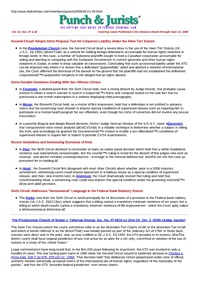Sentence for drug crimes is affirmed where: 1) the district court did not err in imposing consecutive prison terms under 18 U.S.C. § 924(c)(1)(A)(i) as the Whitley/Williams rule has no bearing on this case since the predicate drug crime underlying defendant's conviction does not dictate a mandatory minimum sentence; …
In Irizarry v. U.S., 128 S. Ct. 2198 (2008) a sharply divided Supreme Court held, by a 5-4 vote, that Rule 32(h) of the Fed.R.Crim.P. does not require advance notice to a defendant when the district court is contemplating imposing a variance (as opposed to a departure) from the …
The central issue in this case was whether probable cause existed to obtain a search warrant to search a person’s home and computer based on the sole fact that he purchased a one-month subscription to a child pornography web site.
In this case, an agent from the Bureau of …
U.S. v. Head, 552 F.3d 640 (7th Cir. Jan. 15, 2009) (Judge Williams)
U.S. v. Anderson, 583 F.3d 504 (7th Cir. Oct. 9, 2009) (Judge Wood)
It is not often that one sees a Circuit make an almost complete about-face in the space of nine months - but that’s …
U.S. v. Head, 552 F.3d 640 (7th Cir. Jan. 15, 2009) (Judge Williams)
U.S. v. Anderson, 583 F.3d 504 (7th Cir. Oct. 9, 2009) (Judge Wood)
It is not often that one sees a Circuit make an almost complete about-face in the space of nine months - but that’s …
As this case shows, the patchwork of American criminal laws have become a Byzantine maze of unparalleled proportions that sometimes defies comprehension. In this case, the Sixth Circuit addressed a complicated and counter-intuitive provision known as the Federal Bank Robbery Statute (“FBRS”), which is codified at 18 U.S.C. § …
The Alien Tort Statute (which the courts sometimes refer to as the “Alien Tort Claims Act” or the “Alien Tort Act” and which is herein referred to as the “ATS”) was initially passed as part of the Judiciary Act of 1789. In those days, statutes were direct and to …
Here the Court declined to reconsider en banc an earlier decision which held that a within-Guidelines sentence was substantively unreasonable - over the dissent of five judges who were concerned about the precedential impact of that ruling.
In an unpublished decision in U.S. v. Paul, 239 Fed. Appx. …
In this case, Judge Mordue held that sex offenders can be required to submit to computerized voice stress analysis (“CVSA”) as part of their post-release supervision to determine if they are telling the truth. CVSA exams have become the latest rage among law enforcement agencies throughout the United States: …
District court order granting defendant's motion to suppress statements made by him to FBI agents while in custody is affirmed where: 1) defendant was entitled to the prophylactic bar prohibiting police questioning when he refused to sign the waiver-of-rights form, and the court did not err in finding that …
